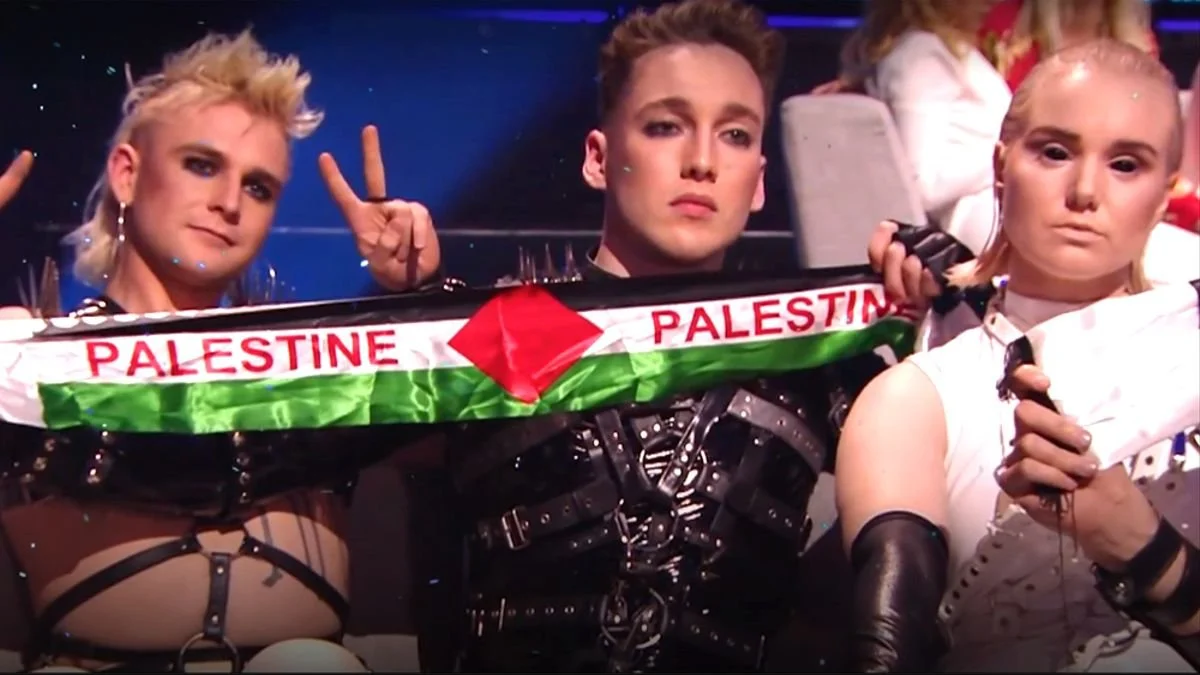A SONG CALLED HATE
Directing: B
Writing: B-
Cinematography: B
Editing: B
If ever there were a representation of the wide cultural differences between Europe and the deeply puritanical roots of the United States, it’s the documentary A Song Called Hate, about an Icelandic band that succeeded in pulling an anti-Israeli political stunt during their participation on the 2019 Eurovision contest, held in Tel Aviv, Israel. The film is made by an Icelander, who treats the band’s history of fetishistic theatrics as entirely incidental.
Conversely, half of America would be truly triggered by this movie, for reasons that have nothing to do with the issue at the forefront of the story—which is, ostensibly at least, the Israeli occupation of Palestine. This is why I, as an American, really want to say a few things about the cultural context from which this band comes. It can be jarring for us to see two straight men playing “characters” in their purportedly “anticapitalist,” BDSM-inspired band, adopting an aesthetic I typically only see at American Pride Parades.
The two singers in the band, Klemens Hannigan and Matthías Haraldsson, are cousins, who wear often very revealing leather outfits and heavy eye makeup (“Chilren and vegans should look away,” says one Eurovision announcer), and who occasionally hold hands. They walk around clearly very secure in their sexualities, as is evidently everyone around them, and they adopt ironic catchphrases that would easily be misinterpreted and taken wildly out of context in the U.S., such as “hatred will prevail.” The catchphrase is meant as a warning, an illustration of what will be the consequence later if we don’t do what’s right today.
As shown in A Song Called Hate, the band Hatari have an established history of using their art to make political statements. They won the Eurovision competition in Iceland that year, but Iceland overall being very supportive of a movement to boycott Eurovision due to it being held that year in Israel, Hatari’s decision to go there to compete was met with great resistance at home. A petition to keep them from going garnered over 30,000 signatures, which was about 8% of the country’s population.
Hatari amuses themselves with their own contradictions, holding anticapitalist principals while participating in a deeply capitalist enterprise like Eurovision. They go to Israel, cameras in tow, meet up with Palestinian artists (including a fashion designer and a musician), and spend some time getting guided tours of parts of the West Bank. There’s a lot of talk about how they can use this platform to make a statement about the Israeli occupation of Palestine, which culminates in a moment barely given a second of air time, but still enough to anger many of the show’s worldwide 200 million viewers, and please a large number of Palestinians.
Much is made of event organizers insisting that the show is apolitical, and no participant is allowed to make political statements. This idea is preposterous on its face, as the very decision to hold the event in Tel Aviv is inherently political, as is something—as noted by a local Israeli—as simple as where someone buys bread on what day of the week.
There’s a great deal of food for thought here, but there’s also an odd sort of distancing in the watching of A Song Called Hate. (Side note: “Hatari” liteally means “Hater,” and the song they sing at Eurovision translates to “Hatred Will Prevail,” so I’m slightly confused by the film’s title being A Song Called Hate rather than either A Song Called Hatred Will Prevail or A Band Called Hater. I guess neither of those have quite the same ring to them.) Sometimes the story of the band’s small act of protest—but with a gargantuan audience—feels exaggerated in impact or import. Furthermore, there’s a slight uneasiness felt in the centering of a frankly privileged bunch of white people from Iceland doing this supposedly heroic act for the helpless brown people in the Middle East.
But here, again, we get back to my very biased point of view as an American, someone with not near enough exposure to the worldviews of other societies. The several interview subjects in this film include Iceland’s Prime Minister, a woman named Katrín Jakobsdóttir. It’s endlessly fascinating to me that someone like her, along with everyone else interviewed for this film, can speak seriously about Hatari’s art, its impact and its symbolism while hardly addressing their pointedly BDSM-inspired aesthetic. This film ends with clips of young children adopting their leather-and-chains look, as though that’s perfectly normal—and to be fair, in context, it seems to be; conservative Americans would never think so, but the children aren’t being sexualized, and their outfits aren’t revealing. It’s still unusual.
To be fair, in the many clips of Hatari’s live performances, they don’t seem all that sexualized either, somehow. As they scream-sing about the risks of allowing hatred to prevail, their fetishistic adornments take on a decidedly asexual tone. I suppose it’s one of the many tricks this globally unique band manages to pull off. That said, once we finally see their Eurovision stunt, it’s hard to decipher how much attention it deserves, such as in a feature length documentary film, which sometimes feels padded with filler. I enjoyed A Song Called Hate, but likely would have enjoyed it a lot more as a documentary short.
Someone got a very brief shot of the messengers.
Overall: B

